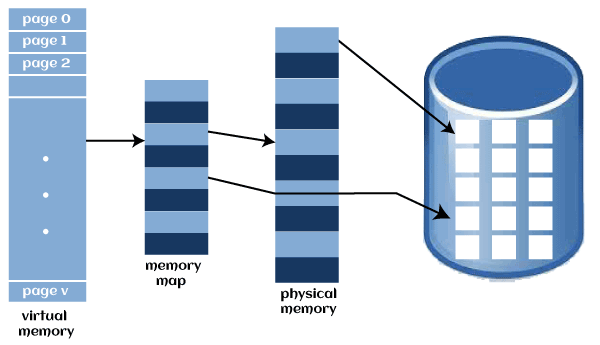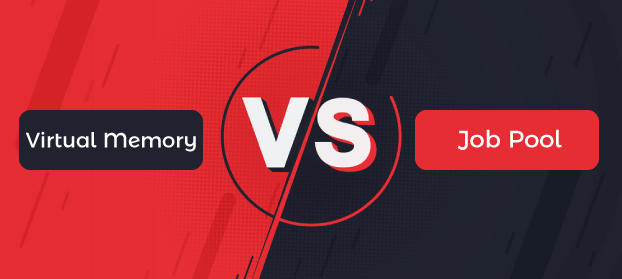Difference between Virtual Memory and Job PoolBoth virtual memory and job pools temporarily store the processes on disk and bring them to memory later. When a process is just created, it first goes to the job pool and then is sent to the ready queue. Virtual memory is only used when available memory becomes smaller than the required memory for any process. In this article, you will learn about the difference between virtual memory and job pool. Still, before discussing the differences, you have to know about the virtual memory and job pool in the operating system. What is Virtual Memory?A computer can address more memory than the amount physically installed on the system. This extra memory is called virtual memory, and it is a section of a hard disk that's set up to emulate the computer's RAM. Virtual memory is a common technique used in a computer's operating system (OS). Virtual memory uses both hardware and software to enable a computer to compensate for physical memory shortages, temporarily transferring data from RAM to disk storage. Mapping chunks of memory to disk files enables a computer to treat secondary memory as the main memory. 
Virtual memory is important for improving system performance and multitasking. The main advantage of this scheme is that programs can be larger than physical memory. However, users should not overly rely on virtual memory since it is considerably slower than RAM. If the OS swaps data between virtual memory and RAM too often, the computer will slow down. Virtual memory serves two purposes.
Benefits of Using Virtual Memory Here are the following advantages or benefits of using virtual memory, such as:
What is Job Pool?A job pool is a type of data structure in a batch processing system where various jobs are queued to be implemented when all the resources are made available. It decides which job will be executed next. The job pool contains both jobs that are currently executing and jobs that have been scheduled but are not yet being executed. When a job is executing, it is fully present in memory. The main design is that whenever a new job is created, it is stored in the job pool, and when it becomes ready to be executed, it must be stored in the physical memory. But when a very large memory is required, only a part of the main memory gets executed while the remaining memory gets stored in the virtual memory. Modern systems don't work this way. Computers that are big enough to run multiple tasks have a memory management unit that translates virtual memory addresses to physical addresses. And the operating system uses that to move each page between memory and disk this is called swapping or paging. This is an evolution from earlier multiprocessing systems. At first, processes were swapped as a whole. But nowadays, if there isn't enough memory to fit all currently running processes, the operating system can swap out the parts of processes that aren't currently being used. Systems designed for large non-interactive computations generally use job management even today. Swapping takes time if the active processes require more memory than is available to run comfortably, which causes thrashing. To avoid this, job schedulers use job pools, arrange to start jobs, and possibly pause them based on available resources. The system works on top of an operating system based on virtual memory, so once a job is paused, it will naturally be swapped out as its pages in RAM are replaced by pages of active jobs. Benefits of Using Job Pool Here are the following benefits of using a job pool in an operating system, such as:
Difference between Virtual Memory and Job PoolThe virtual memory and the job pool are used to store processes in a hard disk for some time and then later load them into the main memory. 
But they are different from each other in many ways, so below are the following differences between virtual memory and Job Pool such as:
Next TopicWhat is Memory Ballooning
|
 For Videos Join Our Youtube Channel: Join Now
For Videos Join Our Youtube Channel: Join Now
Feedback
- Send your Feedback to [email protected]
Help Others, Please Share









